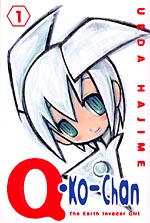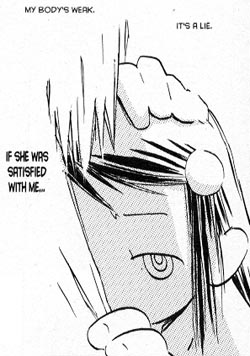 By Ueda Hajime
By Ueda Hajime
208 pages, black and white
Published by Del Rey
What grabbed me immediately about Q-Ko-Chan wasn’t that it was another story about a boy discovering an alien in his backyard. Rather, it was that Q-Ko-Chan is anything but “another story” about a boy and an alien. Reading this book is a perfect reminder that you can take the most standard story idea in the world and still make it exciting and different in the art of the telling.
 Kirio’s used to aliens showing up all over the place; every time he turns around a new group of aliens seem to be invading Earth. His mother’s a member of the Special Operations Force, and he’s practically the star of his friends at school. Then a strange robot alien shows up at his doorstep, and everything turns upside down for Kirio and his friends, but probably not in the way that anyone was expecting.
Kirio’s used to aliens showing up all over the place; every time he turns around a new group of aliens seem to be invading Earth. His mother’s a member of the Special Operations Force, and he’s practically the star of his friends at school. Then a strange robot alien shows up at his doorstep, and everything turns upside down for Kirio and his friends, but probably not in the way that anyone was expecting.
Q-Ko-Chan is a positively strange little book. It’s ostensibly about robots and aliens, but that’s really just what exists on the surface. This is about a lot of big emotional issues; about wanting to be part of a partnership, about jealousy, about wanting to be used, about feeling like you belong. This is really a book about relationships and everything that they bring to the surface in people around us. Don’t get me wrong, there’s still big aliens and robots fighting in our skies, and those scenes are pretty exciting. But in many ways they’re just the window dressing for the emotional heart of the book. There’s so much attention brought to the littler things, like the ties of family that define so much of the kids’s lives, that really shine through. This is a book that really had to star kids because they’re still so emotionally raw and confused that every little event can still upset them and rock their worlds.
 As cool as the story in Q-Ko-Chan is, it’s Ueda Hajime’s art that will grab you from the word go. Probably familiar to manga readers as the artist who adapted FLCL into print, Hajime’s art is a minimalistic, sharp-edged masterpiece. Hajime is able to define characters with long, sweeping strokes of the pen that jut across the page, lines at distinct angles from one-another. There isn’t a lot of detail crammed into each figure, but there doesn’t need to be. From octopus-aliens to cute schoolgirls, each character has their own unique and striking look that will stick with you as a reader. It’s almost surprising what Hajime can do with a few—or when he feels like it, a lot—of lines to define a figure on the page. Even after you’ve read and absorbed the story of Q-Ko-Chan, you’ll keep re-reading it to simply gaze at the art.
As cool as the story in Q-Ko-Chan is, it’s Ueda Hajime’s art that will grab you from the word go. Probably familiar to manga readers as the artist who adapted FLCL into print, Hajime’s art is a minimalistic, sharp-edged masterpiece. Hajime is able to define characters with long, sweeping strokes of the pen that jut across the page, lines at distinct angles from one-another. There isn’t a lot of detail crammed into each figure, but there doesn’t need to be. From octopus-aliens to cute schoolgirls, each character has their own unique and striking look that will stick with you as a reader. It’s almost surprising what Hajime can do with a few—or when he feels like it, a lot—of lines to define a figure on the page. Even after you’ve read and absorbed the story of Q-Ko-Chan, you’ll keep re-reading it to simply gaze at the art.
The first in a two-volume series, Q-Ko-Chan is an off-the-wall story that is much more effective than most of its similar compatriots. Hajime knows how to take a basic idea and turn it around, making an alien invasion story more about relationships and emotions than the aliens… but without ever losing track of the fact that this is still an alien invasion story. It’s a careful balancing act that is ultimately impressive, and one of the best releases from Del Rey’s manga line this year. This is a lot of fun.
Purchase Links:
